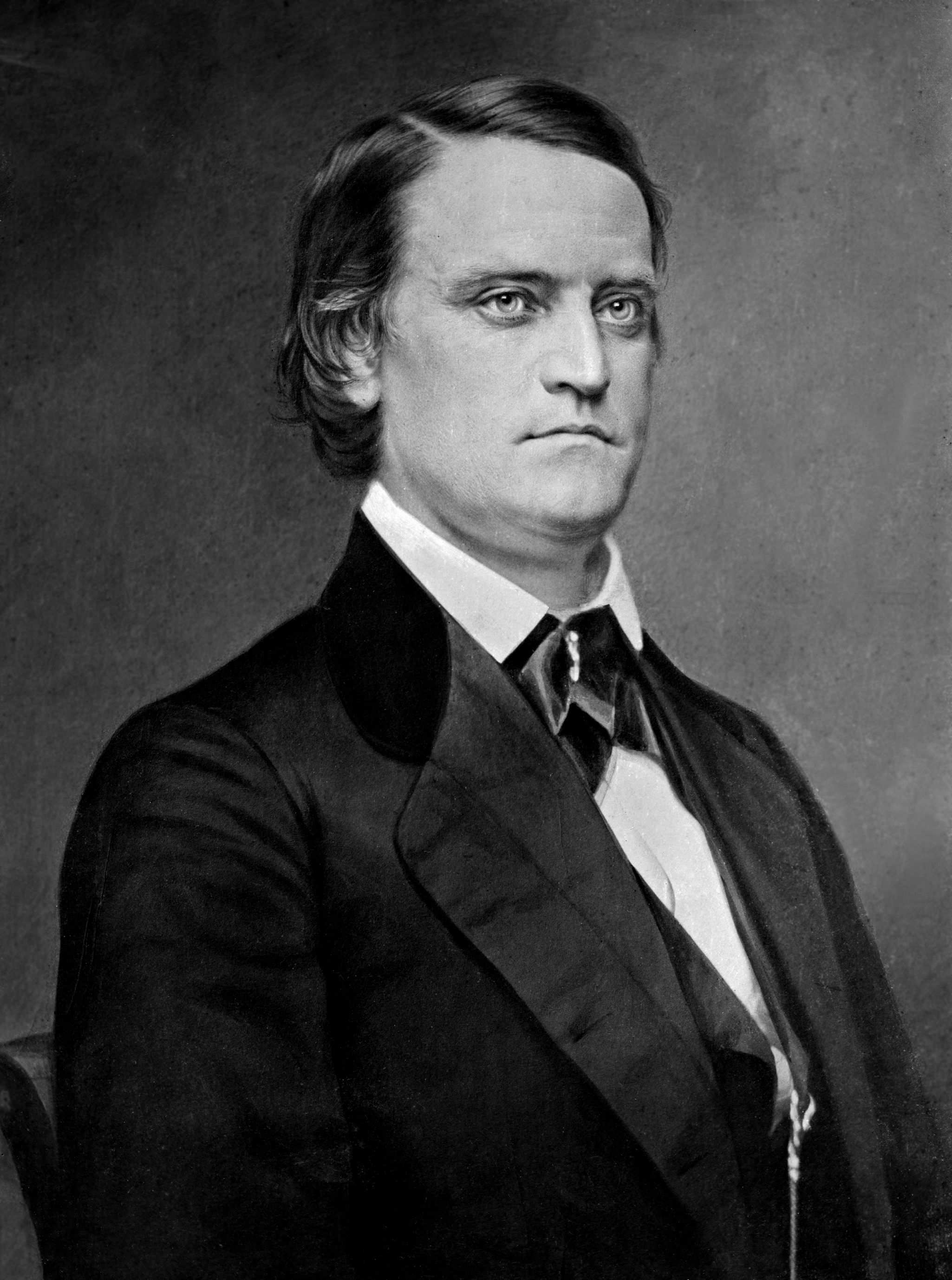|
1860 Missouri Gubernatorial Election
The 1860 Missouri gubernatorial election was held on August 6, 1860, and resulted in a victory for the Democratic nominee, Claiborne Fox Jackson. Jackson defeated the nominee of the Constitutional Union Party, Semple Orr, and Southern "Brekenridge" Democrat Former Gov. Hancock Lee Jackson to become the fifteenth governor of Missouri. Republican James B. Gardenhire also ran in the election, but received a negligible number of votes. Before the next election in 1864, three men would serve as Governor of Missouri: first, Claiborne Fox Jackson until his defection to the Confederacy in July 1861, then Hamilton Rowan Gamble until his death in January 1864, and finally Lt. Gov Willard Preble Hall. Results References {{reflist Missouri 1860 Gubernatorial A governor is an politician, administrative leader and head of a polity or Region#Political_regions, political region, ranking under the Head of State, head of state and in some cases, such as governor-general, gove ... [...More Info...] [...Related Items...] OR: [Wikipedia] [Google] [Baidu] |
Claiborne Fox Jackson
Claiborne Fox Jackson (April 4, 1806 – December 6, 1862) was an American politician of the Democratic Party in Missouri. He was elected as the 15th Governor of Missouri, serving from January 3, 1861, until July 31, 1861, when he was forced out by the Unionist majority in the legislature, after planning to force secession of the state. Before the war, Jackson worked with his father-in-law, John Sappington, to manufacture and sell patent medicines, in the form of quinine pills, to treat and prevent malaria. He became quite wealthy and politically influential, deeply involved in the Democratic party in Saline County and central Missouri. He served twelve years in the Missouri House of Representatives, twice as Speaker. In 1848 he was elected to the State Senate. To win votes in the 1860 election, Jackson claimed to be anti-secession, but he was secretly planning a secessionist coup in league with Confederate President Jefferson Davis. Nathaniel Lyon, Union commander of t ... [...More Info...] [...Related Items...] OR: [Wikipedia] [Google] [Baidu] |
Governor Of Missouri
A governor is an politician, administrative leader and head of a polity or Region#Political_regions, political region, ranking under the Head of State, head of state and in some cases, such as governor-general, governors-general, as the head of state's official representative. Depending on the type of political region or polity, a ''governor'' may be either appointed or elected, and the governor's powers can vary significantly, depending on the Public law, public laws in place locally. The adjective pertaining to a governor is gubernatorial, from the Latin root ''gubernare''. Ancient empires Pre-Roman empires Though the legal and administrative framework of provinces, each administrated by a governor, was created by the ancient Rome, Romans, the term ''governor'' has been a convenient term for historians to describe similar systems in ancient history, antiquity. Indeed, many regions of the pre-Roman antiquity were ultimately replaced by Roman 'standardized' provincial governments ... [...More Info...] [...Related Items...] OR: [Wikipedia] [Google] [Baidu] |
Missouri Gubernatorial Elections
Missouri is a state in the Midwestern region of the United States. Ranking 21st in land area, it is bordered by eight states (tied for the most with Tennessee): Iowa to the north, Illinois, Kentucky and Tennessee to the east, Arkansas to the south and Oklahoma, Kansas and Nebraska to the west. In the south are the Ozarks, a forested highland, providing timber, minerals, and recreation. The Missouri River, after which the state is named, flows through the center into the Mississippi River, which makes up the eastern border. With more than six million residents, it is the 19th-most populous state of the country. The largest urban areas are St. Louis, Kansas City, Springfield and Columbia; the capital is Jefferson City. Humans have inhabited what is now Missouri for at least 12,000 years. The Mississippian culture, which emerged at least in the ninth century, built cities and mounds before declining in the 14th century. When European explorers arrived in the 17th centu ... [...More Info...] [...Related Items...] OR: [Wikipedia] [Google] [Baidu] |
1860 United States Gubernatorial Elections
Year 186 ( CLXXXVI) was a common year starting on Saturday (link will display the full calendar) of the Julian calendar. At the time, it was known as the Year of the Consulship of Aurelius and Glabrio (or, less frequently, year 939 ''Ab urbe condita''). The denomination 186 for this year has been used since the early medieval period, when the Anno Domini calendar era became the prevalent method in Europe for naming years. Events By place Roman Empire * Peasants in Gaul stage an anti-tax uprising under Maternus. * Roman governor Pertinax escapes an assassination attempt, by British usurpers. New Zealand * The Hatepe volcanic eruption extends Lake Taupō and makes skies red across the world. However, recent radiocarbon dating by R. Sparks has put the date at 233 AD ± 13 (95% confidence). Births * Ma Liang, Chinese official of the Shu Han state (d. 222) Deaths * April 21 – Apollonius the Apologist, Christian martyr * Bian Zhang, Chinese official and gener ... [...More Info...] [...Related Items...] OR: [Wikipedia] [Google] [Baidu] |
Willard Preble Hall
William Willard Preble Hall (May 9, 1820November 2, 1882) was an American lawyer and politician. He served as the 17th Governor of Missouri from 1864 to 1865 during the last years of the American Civil War. Early years Hall was born in Harpers Ferry, then in Virginia. He attended a private school in Baltimore, Maryland, and graduated from Yale University in 1839. He accompanied his father, John H. Hall, to Randolph County, Missouri, in 1840. He studied law and was admitted to the bar at Huntsville in 1841, commencing his law practice in Sparta in 1842. He was appointed circuit attorney in 1843 and served for several years. He was a presidential elector on the Democratic ticket in 1844. During the Mexican–American War, Hall enlisted as a private in the First Missouri Cavalry Regiment and later was promoted to lieutenant. He was appointed by General Kearny, together with Col. Alexander Doniphan, to construct the code of civil laws known as the Kearny code in both English an ... [...More Info...] [...Related Items...] OR: [Wikipedia] [Google] [Baidu] |
Hamilton Rowan Gamble
Hamilton Rowan Gamble (November 29, 1798 – January 31, 1864) was an American jurist and politician who served as the Chief Justice of the Missouri Supreme Court at the time of the Dred Scott case in 1852. Although his colleagues voted to overturn the 28-year precedent in Missouri of "once free always free," Gamble wrote a dissenting opinion. During the American Civil War, he was appointed as the Governor of Missouri by a Constitutional Convention after Union forces captured the state capital at Jefferson City and deposed the elected governor, Claiborne Jackson. Early life and education Hamilton Gamble was born in 1798 in Winchester, Virginia, in the Shenandoah Valley, the youngest of seven children of Joseph and Anne Hamilton Gamble. His parents were Scots-Irish immigrants who had reached Virginia in 1784 from northern Ireland. Gamble first studied locally and at age 13 went to Hampden-Sydney College, a Presbyterian seminary or secondary academy. [...More Info...] [...Related Items...] OR: [Wikipedia] [Google] [Baidu] |
Confederate States Of America
The Confederate States of America (CSA), commonly referred to as the Confederate States or the Confederacy was an unrecognized breakaway republic in the Southern United States that existed from February 8, 1861, to May 9, 1865. The Confederacy comprised U.S. states that declared secession and warred against the United States during the American Civil War: South Carolina, Mississippi, Florida, Alabama, Georgia, Louisiana, Texas, Virginia, Arkansas, Tennessee, and North Carolina. Kentucky and Missouri also declared secession and had full representation in the Confederate Congress, though their territory was largely controlled by Union forces. The Confederacy was formed on February 8, 1861, by seven slave states: South Carolina, Mississippi, Florida, Alabama, Georgia, Louisiana, and Texas. All seven were in the Deep South region of the United States, whose economy was heavily dependent upon agriculture—particularly cotton—and a plantation system that relied upon enslaved ... [...More Info...] [...Related Items...] OR: [Wikipedia] [Google] [Baidu] |
1864 Missouri Gubernatorial Election
The 1864 Missouri gubernatorial election was held on November 8, 1864, and resulted in a victory for the Union Republican nominee, Thomas Clement Fletcher, over Democratic nominee former Congressman (and former Lt. Gov.) Thomas Lawson Price. Results References {{Reconstruction Era Missouri 1864 Gubernatorial A governor is an administrative leader and head of a polity or political region, ranking under the head of state and in some cases, such as governors-general, as the head of state's official representative. Depending on the type of political ... November 1864 events ... [...More Info...] [...Related Items...] OR: [Wikipedia] [Google] [Baidu] |
Claiborne Fox Jackson
Claiborne Fox Jackson (April 4, 1806 – December 6, 1862) was an American politician of the Democratic Party in Missouri. He was elected as the 15th Governor of Missouri, serving from January 3, 1861, until July 31, 1861, when he was forced out by the Unionist majority in the legislature, after planning to force secession of the state. Before the war, Jackson worked with his father-in-law, John Sappington, to manufacture and sell patent medicines, in the form of quinine pills, to treat and prevent malaria. He became quite wealthy and politically influential, deeply involved in the Democratic party in Saline County and central Missouri. He served twelve years in the Missouri House of Representatives, twice as Speaker. In 1848 he was elected to the State Senate. To win votes in the 1860 election, Jackson claimed to be anti-secession, but he was secretly planning a secessionist coup in league with Confederate President Jefferson Davis. Nathaniel Lyon, Union commander of t ... [...More Info...] [...Related Items...] OR: [Wikipedia] [Google] [Baidu] |
Republican Party (United States)
The Republican Party, also referred to as the GOP ("Grand Old Party"), is one of the two major contemporary political parties in the United States. The GOP was founded in 1854 by anti-slavery activists who opposed the Kansas–Nebraska Act, which allowed for the potential expansion of chattel slavery into the western territories. Since Ronald Reagan's presidency in the 1980s, conservatism has been the dominant ideology of the GOP. It has been the main political rival of the Democratic Party since the mid-1850s. The Republican Party's intellectual predecessor is considered to be Northern members of the Whig Party, with Republican presidents Abraham Lincoln, Rutherford B. Hayes, Chester A. Arthur, and Benjamin Harrison all being Whigs before switching to the party, from which they were elected. The collapse of the Whigs, which had previously been one of the two major parties in the country, strengthened the party's electoral success. Upon its founding, it supported c ... [...More Info...] [...Related Items...] OR: [Wikipedia] [Google] [Baidu] |
Southern Democratic (United States)
Southern Democrats, historically sometimes known colloquially as Dixiecrats, are members of the U.S. Democratic Party who reside in the Southern United States. Southern Democrats were generally much more conservative than Northern Democrats with most of them voting against the Civil Rights Act of 1964 by holding the longest filibuster in the American Senate history while Democrats in non-Southern states supported the Civil Rights Act of 1964. After 1994 the Republicans typically won most elections in the South. In the 19th century, Southern Democrats were people in the South who believed in Jacksonian democracy. In the 19th century, they defended slavery in the United States, and promoted its expansion into the West against northern Free Soil opposition. The United States presidential election of 1860 formalized the split in the Democratic Party and brought about the American Civil War. Stephen Douglas was the candidate for the Northern Democratic Party, and John C. Breckinrid ... [...More Info...] [...Related Items...] OR: [Wikipedia] [Google] [Baidu] |



.jpg)


